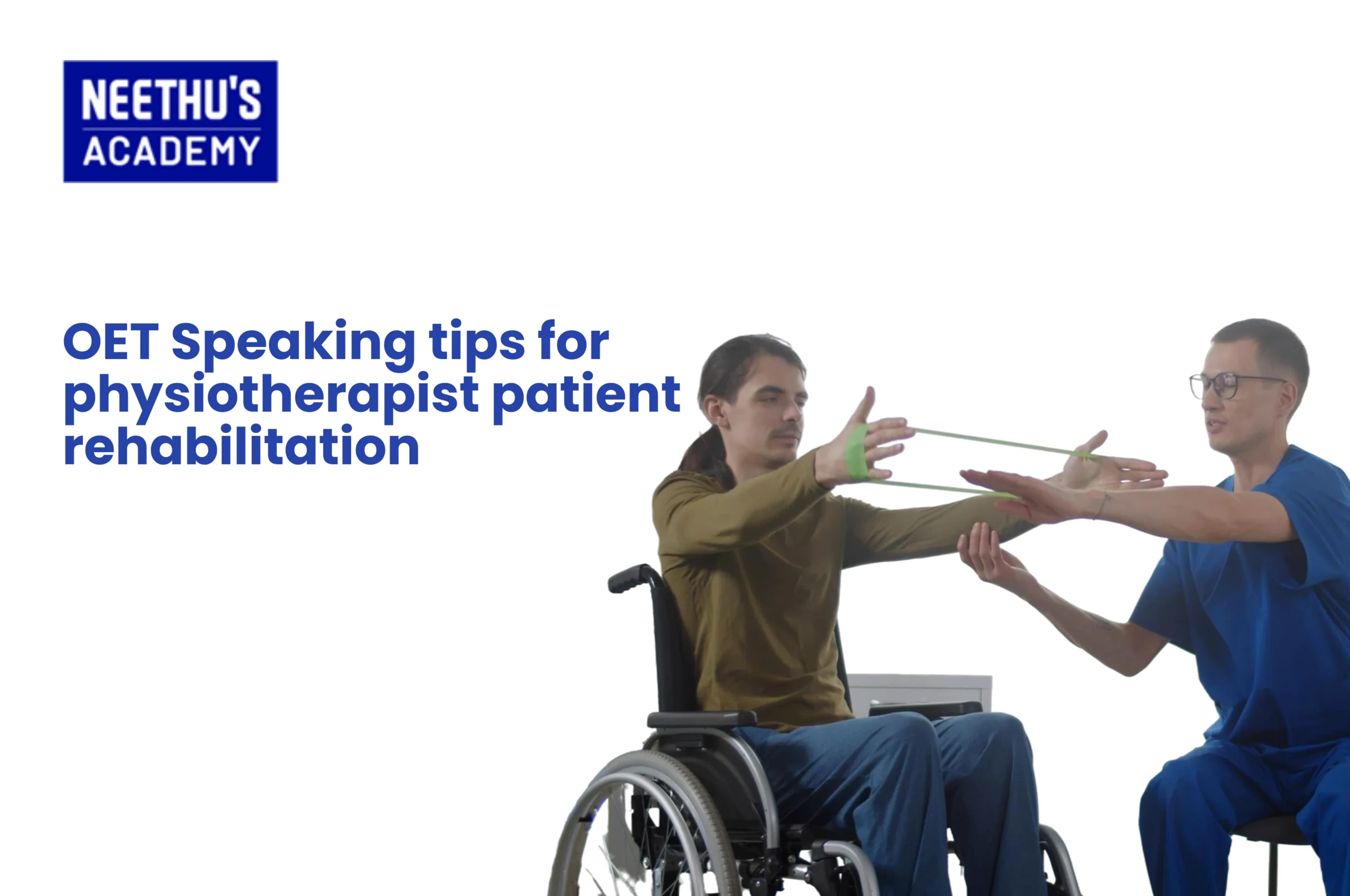The Occupational English Test is an entry pass for health care providers, including pharmacists, showing proof of proficiency in using English in…

OET Speaking Tips For Physiotherapist Patient Rehabilitation
The Occupational English Test (OET) is one of the most important entry requirements for any health professional, including physiotherapists, looking to work in English-speaking countries. One of the most important sub-tests in the OET exam is the Speaking test, which mimics real-life clinical settings. For physiotherapists, it mainly comprises role-plays that are concerned with the rehabilitation of patients, making good communication skills a virtual success factor. Whether you are a new student or want to improve your skills, this guide provides useful tips in OET speaking for physiotherapists, allowing you to excel in the exam and actual practice.
Importance of Effective Communication in Patient Rehabilitation
Effective communication in physiotherapy is as vital as clinical competency. Rehabilitated patients are often faced with pain in their bodies, emotional anxiety, and fear of not improving. Your role as a physiotherapist is not only heal them but also to comfort, educate, and motivate them.
Developing effective OET physiotherapist communication skills is vital because:
It ensures patients understand their diagnosis and treatment plan.
It builds trust and increases therapy adherence.
It lowers stress and promotes a warm, healing atmosphere.
It mirrors real-life scenarios that could appear in clinical practice.
The OET tests how efficiently you manage these communication tasks, so it is extremely important to prepare specifically for the OET physiotherapist patient rehabilitation setting.
Challenges Shared in OET Speaking for Physiotherapists
Most test takers find the OET Speaking test difficult because:
Anxiety in role-play interactions.
Limited vocabulary related to rehabilitation and physiotherapy.
Ambiguous descriptions of treatment plans or exercise routines.
Inability to handle empathy and patient issues in a natural flow.
Failure to incorporate OET-specific phrases to begin and end discussions effectively.
In order to overcome these challenges, physiotherapists need to practice not just clinical information but also subtle English communication specifically for the OET.
Best OET Speaking Tips for Physiotherapist Role-Plays
Below are actionable OET speaking tips that will enable you to approach your OET physiotherapist role-play situations with confidence:
1. Address the Patient’s Concerns
Begin by asking open-ended questions such as:
“Can you describe where it hurts a little more?”
“How long have you had this problem?”
This is empathetic and rapport-building in nature.
2. Use Simple Language
Steer clear of medical jargon. Rather than stating, “You have a rotator cuff injury,” state, “You’ve strained the muscles in your shoulder.”
3. Organize Your Explanation
Employ the ‘Chunk and Check’ method:
Provide small chunks of information.
Pause and check understanding: “Does that make sense?”
4. Show Empathy
Words that express understanding are:
“I understand this must be frustrating.”
“It’s perfectly normal to feel anxious during recovery.”
5. Practice Active Listening
Show that you understand what the patient says with statements such as:
“I see, thanks for telling me.”
“That helps me get a clearer picture of your situation.”
6. Use OET-Friendly Openers and Closers
Begin the role-play with:
“Hello, I’m [Your Name], a physiotherapist here. How can I assist you today?”
Finish with:
Do you have any questions before we conclude our session?”
“I will check on your progress in our next session.”
7. Timed Role-Plays with a Friend or Coach
Practice under test conditions with a friend or coach to enhance fluency and confidence.
Sample Role-Play Situation: Rehabilitation of Patients
Situation: You are a physiotherapist in an outpatient environment. Your patient is a 45-year-old individual who has just undergone knee surgery and is starting the rehab process. They are worried about pain during exercise.
Role-Play Tips:
Welcome and build rapport: “Hi, I’m your physiotherapist today. You’ve just had surgery on your knee, isn’t it—how’s the recovery been so far?”
Reassure: “Worrying is natural, but we will take you through it step by step and keep you comfortable.”
Explain: “These exercises strengthen your knee and get it moving again.” We will begin with easy stretches.”
Check Understanding: “Is this the comfortable pace for you? Do you have any pain?”
Close Positively: “Good effort today. I’ll see you again in our next session. Keep using the ice pack as we’ve discussed.”
Improving OET Speaking Skills
If you wish to improve OET speaking, strategy and consistency are essential. The following are proven and tried techniques for improving your performance:
Record and evaluate your speaking to identify weak areas.
Practice daily using practice role-plays that are used in physiotherapy.
Join study groups or online forums dedicated to OET.
Employ patient-related flashcards for vocabulary.
Get feedback from OET instructors or senior colleagues.
One of the best methods to improve your speaking fluency is to visit a good coaching center that offers professional OET coaching for physiotherapists.
Best OET Coaching Center in Kerala
Neethu’s Academy, the best OET Coaching center in Kerala offers one-on-one attention, OET-specific training modules, real-time speaking evaluations, and professional coaching customized for healthcare professionals, such as physiotherapists.
They also provide:
Free practice speaking sessions.
Practical mock tests.
Guidance from certified language instructors.
Conclusion
Achieving the OET speaking skills needed to rehabilitate patients is not merely a matter of passing the test—it’s about being a confident, effective health communicator. By following the correct tips, doing regular practice, and taking guidance from a renowned coaching center such as Neethu’s Academy, you can easily crack the OET and start your professional life well-prepared.
If you’re just beginning or want to enhance your speaking ability, let this guide serve as your roadmap to success in the OET and beyond.
Frequently Asked Questions
Start with a polite greeting, state your identity and expressly mention your role, and then ask how you can help.
It’s a language ability test that evaluates the English communication skills of physiotherapists in clinical settings.
Practice role-plays, get feedback, and practice fluency, clarity, and empathy regularly.
Use structured questions, build rapport, check understanding, and display patient-centred communication.
Related Blogs
- All Posts
- OET
Among the several components of the OET, the Speaking sub-test is crucial and evaluates your proficiency not only in language but also…
Preparing for the Occupational English Test (OET) can be a game-changer for nurses aiming to advance their careers globally. At Neethu’s Academy,…
Course Enquiry
Latest Posts
- All Posts
- canada
- CBT
- DHA
- French
- GENERAL
- German
- Haad
- IELTS
- IQN NEW ZEALAND
- MOH
- NCLEX-RN
- NHRA
- OET
- OSCE
- Pearson Vue
- PROMETRIC
- PTE
- TOEFL
- Back
- NCLEX - NGN
- Back
- OET FOR PHYSIOTHERAPIST
- OET FOR PHARMACIST
- OET FOR DOCTORS



